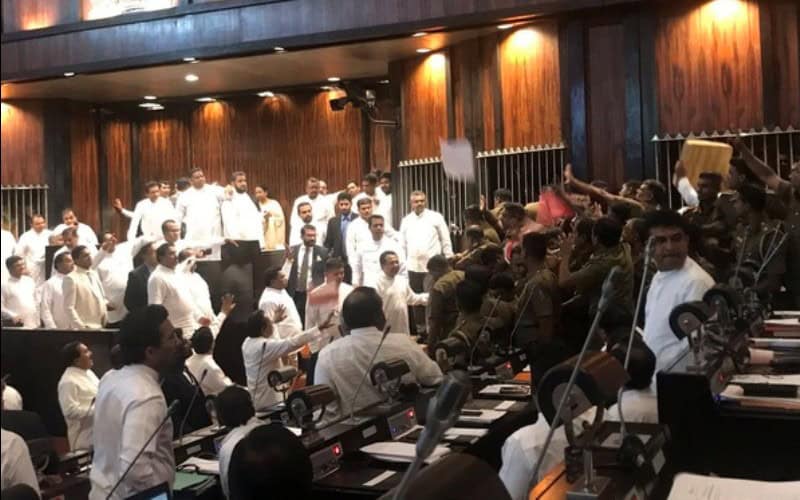Colombo: With the political situation highly turbulent in Sri Lanka, the parties are now waiting for the Supreme Court’s verdict on December 6 to see if the House will be dissolved and Presidential elections will be announced or Ranil Wickremesinghe-led government will continue in office. Till then, political experts feel, the stalemate will continue in the country.
“There is a stalemate at this point of time and the situation is very fluid. The Supreme Court is expected to give its verdict on December 6. Even if the Court gives its verdict in favour of President Sirisena, the elections are not possible before February 2019,” said Sugeeswara Senadhira, Director International Media and Research, in the office of Sri Lankan President.
The genesis of the current problem in Lanka is the recent unconstitutional action of President Maithripala Sirisena, who dismissed the constitutionally elected Prime Minister Ranil Wickremesinghe and appointed former President Mahinda Rajapaksa in his place.
Since Rajapaksa did not have majority in Parliament, President Sirisena, thereafter, prevented Speaker Karu Jayasuriya from convening the House, in order to give time to Rajapaksa to buy up Wickremesinghe’s MPs through inducement of office or money. Rajapaksa, who is seen close to China, was bankrolling this entire process, sources in Colombo said.
However, despite all these efforts, when Rajapaksa failed to gather the required number of MPs, as the majority was still behind Wickremesinghe, President Sirisena dissolved the House and announced fresh elections to be held in January 2019, rather than face defeat on the floor of the House. President Sirisena, however, did not have the powers to dissolve the House. His order was challenged in the Sri Lankan Supreme Court which stayed his orders and reinstated the House.
After reinstatement, when the House met, Rajapaksa failed to prove his majority, and was voted out of office twice through voice vote. But the verdict has been rejected by President Sirisena and Rajapaksa as they have been demanding that the voting should be done electronically and by calling each MP by name to vote.
However, it is felt that this process may lead to targeting of the MPs who vote against Rajapaksa. Already there are charges that following major upsets in the Supreme Court and in the Parliament, Rajapaksa is using money and muscle power to obstruct functioning of the House, and is also intimidating his opponents and their supporters. Sources said an atmosphere of absolute terror now prevails in the country, with the complicity of President Sirisena, who is allowing Rajapaksa goons a free run.
“The issue at present is not Presidential elections but the Parliamentary crisis. We have already shown our majority now with 122 MPs. We will wait and watch what the President will do now,” said Rajitha Senaratne, a leader of Wickremesinghe’s United National Party.
Sri Lankan Parliament remained disrupted for the second day on Friday, with legislators supporting the disputed Prime Minister, Mahinda Rajapaksa, hurling chairs at police officers and throwing chilli powder at the leaders of the Opposition parties.
Amidst all this action, Sri Lankan Parliament will once again meet on Monday though it is not clear if the stalemate will end anytime soon before the Supreme Court verdict.
[source_without_link]ANI[/source_without_link]

